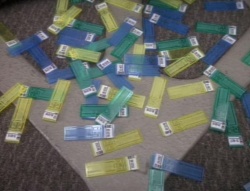Isolinear Chip: Difference between revisions
Nicesociety (talk | contribs) No edit summary |
Nicesociety (talk | contribs) No edit summary |
||
| Line 7: | Line 7: | ||
They were often featured onboard nanotech processors to aid in memory access and with a maximum capacity of 2.15 kiloquads. Though normally easily corrupted, chips may be coated with a layer of clear plastic for protection in environments more hostile than a computer core without affecting read and write capabilities; such ruggedized chips are commonly used in [[tricorder]]s, [[PADD]]s, and other handheld devices with isolinear chip drives. (Star Trek: The Next Generation Technical Manual) | They were often featured onboard nanotech processors to aid in memory access and with a maximum capacity of 2.15 kiloquads. Though normally easily corrupted, chips may be coated with a layer of clear plastic for protection in environments more hostile than a computer core without affecting read and write capabilities; such ruggedized chips are commonly used in [[tricorder]]s, [[PADD]]s, and other handheld devices with isolinear chip drives. (Star Trek: The Next Generation Technical Manual) | ||
:<small><strong>According to the Star Trek: The Next Generation Technical Manual'', without the protective coating the user must wear special gloves to remove the isolinear chip.</strong></small> | |||
In 2377, following Operation Watson when the USS Voyager could have short periods of live contact with [[Earth]] every day, Neelix put 146 sequentially numbered isolinear chips in his hat for the crew to pull - to see in which order they would be able to contact their friends and family. (VOY: "Author, Author") | In 2377, following Operation Watson when the USS Voyager could have short periods of live contact with [[Earth]] every day, Neelix put 146 sequentially numbered isolinear chips in his hat for the crew to pull - to see in which order they would be able to contact their friends and family. (VOY: "Author, Author") | ||
[[Category: Engineering]] | [[Category: Engineering]] | ||
Latest revision as of 21:58, 25 March 2009
Isolinear optical chips (or just Isolinear Chips) are data storage devices utilized in various forms of technology. They are used to store memory in Starfleet PADDs, and are a primary component of Danube Class Runabout's computers. (TNG: "The Naked Now", "A Fistful of Datas", DS9: "The Jem'Hadar")
Optical data-chips were foreseen as early as the mid-1990s, and were expected to be a future development by Chronowerx by the magazine Technology Future. (VOY: "Future's End")
They were often featured onboard nanotech processors to aid in memory access and with a maximum capacity of 2.15 kiloquads. Though normally easily corrupted, chips may be coated with a layer of clear plastic for protection in environments more hostile than a computer core without affecting read and write capabilities; such ruggedized chips are commonly used in tricorders, PADDs, and other handheld devices with isolinear chip drives. (Star Trek: The Next Generation Technical Manual)
- According to the Star Trek: The Next Generation Technical Manual, without the protective coating the user must wear special gloves to remove the isolinear chip.
In 2377, following Operation Watson when the USS Voyager could have short periods of live contact with Earth every day, Neelix put 146 sequentially numbered isolinear chips in his hat for the crew to pull - to see in which order they would be able to contact their friends and family. (VOY: "Author, Author")
